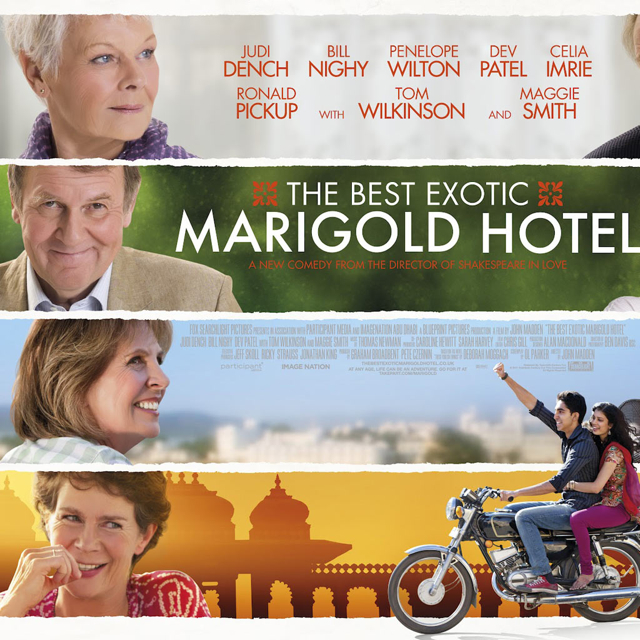
When the opening credits reveal that this film’s complete title is The Best Exotic Marigold Hotel for the Elderly and Beautiful, we know that we’re in for a feel-good film about becoming a senior citizen. And while predictability is the order of the day — three or four time we’re given the catchphrase, “Everything will be alright in the end, so if it’s not alright, it is not yet the end” — there’s enough charm here to please most moviegoers in the mood for some mainstream fare.
Marigold Hotel wastes no time before introducing us to the group of 60- and 70-something Brits who, for a small variety of reasons, have answered an ad for an Indian hotel that turns out to be less than it’s cracked up to be (though everything will be alright in the end &c.]). The guest list is formulaic boilerplate: a xenophobe, a gay man searching for a lost love, a widow who’s never had a job of her own, a randy man and woman hoping they can still get some, a mismatched married couple. Add to the mix a young hotelier and a girlfriend that doesn’t measure up to his mother’s plans for him (but everything will be alright in the end), and you’ve got a set of plot arcs you can see coming a mile away. Someone’s got to die, of course, but even that ends well.
Although the cast sports a heavyweight like Judi Dench, no one really gets to do all that much. It’s a bit surprising, considering that director John Madden has done more with his actors in the past (including with Dench in Her Majesty, Mrs. Brown). But Marigold Hotel is conservative filmmaking top to bottom, from the “aw, shucks” charm (old people are so darned cute when they speak of sex) to the Western Union message that your golden years can be a treasure trove of riches if only you are willing to adapt. The film is so devoid of considering suffering (except for the ostensibly deserved suffering by those who resist adapting) that the only glimpses we get of India’s crushing poverty are colorfully-dressed children who occasionally surround a character but barely ever ask for money to a couple of untouchables who seem content with their caste.
But oftentimes people go to the cinema not to be challenged or stretched, but simply to escape. On that score Marigold Hotel succeeds, from its clean visuals to its “exotic” music to its easy-to-follow, linear storytelling (complete with narrative in the form of Dench’s character’s blog, just to make sure we explicitly understand what we’re supposed to take away from the tale).
Although I haven’t read the novel on which Marigold Hotel is based, it seems in the spiritual tradition and intellectual depth of books like Eat, Pray, Love and The Joy Luck Club, though the cultural wisdom here emanates not from a faraway land (there’s not much in the way of Indian thought on display, save maybe a pitch that outsourcing ain’t so bad) but from a chronological place awaiting all of us (should we live so long). This type of thing is often crowd-pleasing, and Sunday-evening audience with whom I saw the film applauded as the screen faded to black. So while Marigold Hotel won’t be remembered as a piece of cinema, it’s enough to give many the momentary warm fuzzies. And sometimes that’s enough.
• Art Theatre of Long Beach • 2025 E. 4th Street, Long Beach, CA 90804 • (562) 438-5435 • arttheatrelongbeach.com

